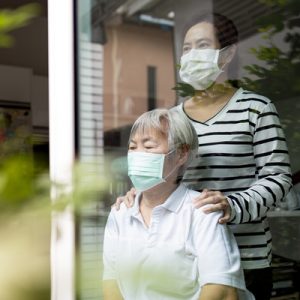The COVID-19 pandemic has added significant new stressors for family caregivers – here’s why that matters
 Nearly 40 percent of all family caregivers find their caregiving situation to be emotionally stressful. When caregivers feel they have no choice in assuming their caregiving duties, this increases to 53 percent. Left unaddressed, caregiver stress can worsen physical, mental, and emotional health, as well as social and financial well-being.
Nearly 40 percent of all family caregivers find their caregiving situation to be emotionally stressful. When caregivers feel they have no choice in assuming their caregiving duties, this increases to 53 percent. Left unaddressed, caregiver stress can worsen physical, mental, and emotional health, as well as social and financial well-being.
The COVID-19 pandemic has created an incredibly challenging environment for family caregivers. Caregivers may have a heightened risk of infection, as research shows that more than one-third have medical conditions that make them more susceptible to contracting COVID-19. And during the pandemic, many caregivers have had to manage risks to their care recipient’s health, as well. Many care recipients are aging or are living with a condition that makes them more susceptible to health complications from a COVID-19 infection.
Family caregivers of adults who are aging with a physical disability have faced some of the greatest challenges during the COVID-19 pandemic.
When a care recipient is both aging and has a physical disability, the challenges imposed by each separate condition can compound and make caregiving duties more difficult. As these individuals age, they are at increased risk for the development of multiple secondary health conditions such as increased fatigue, weakness, and further decreases in stability and mobility. These primary and secondary conditions can require more intensive caregiving, especially in terms of hours spent caregiving and physical caregiving tasks.
Supporting an individual who is aging with a physical disability is not a one-person job. It requires a team of dedicated individuals, from health care professionals to community organization workers, to help aging and disabled individuals live as well as they can. To effectively help family caregivers and alleviate caregiver stress, we need to develop programmatic and policy solutions.